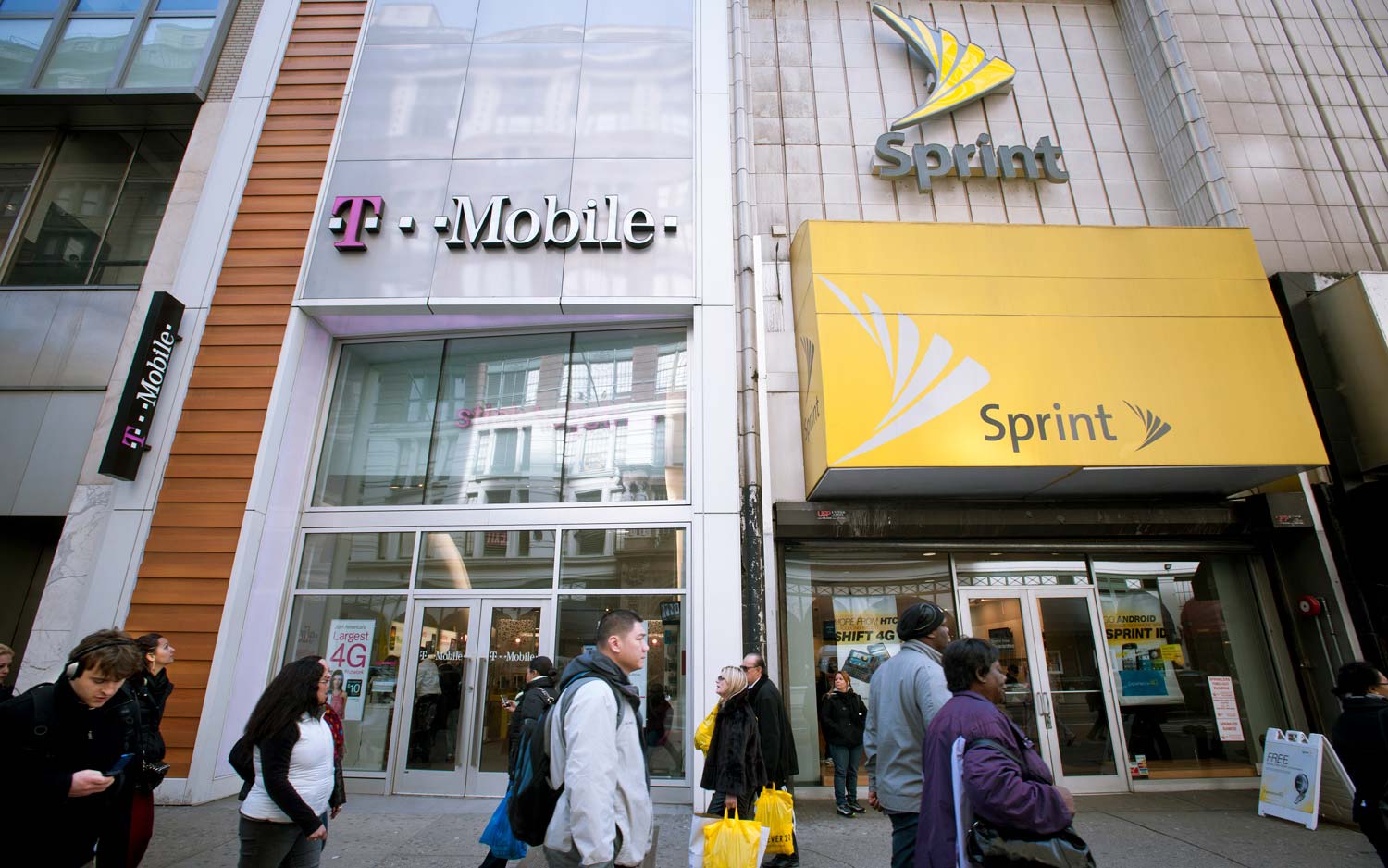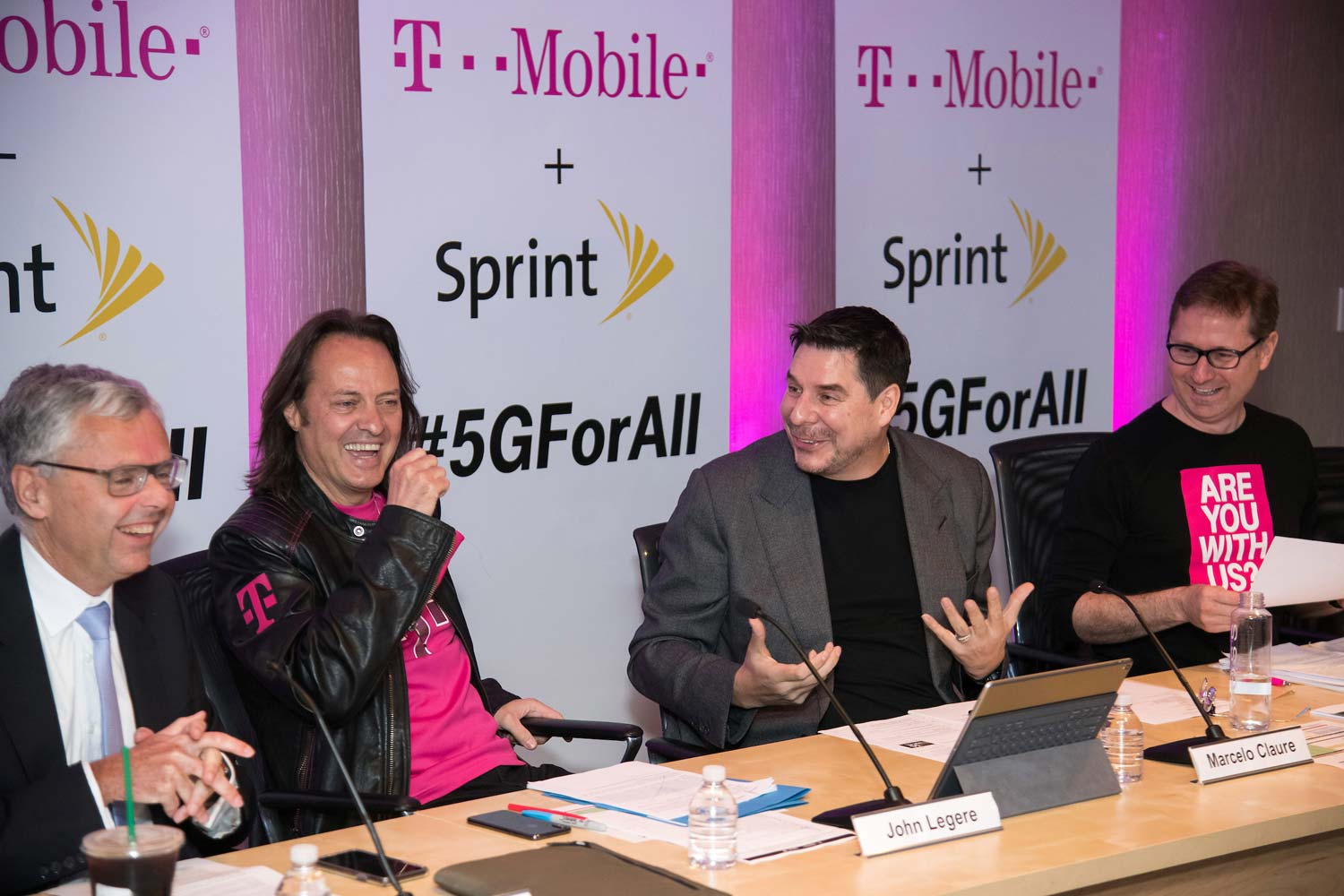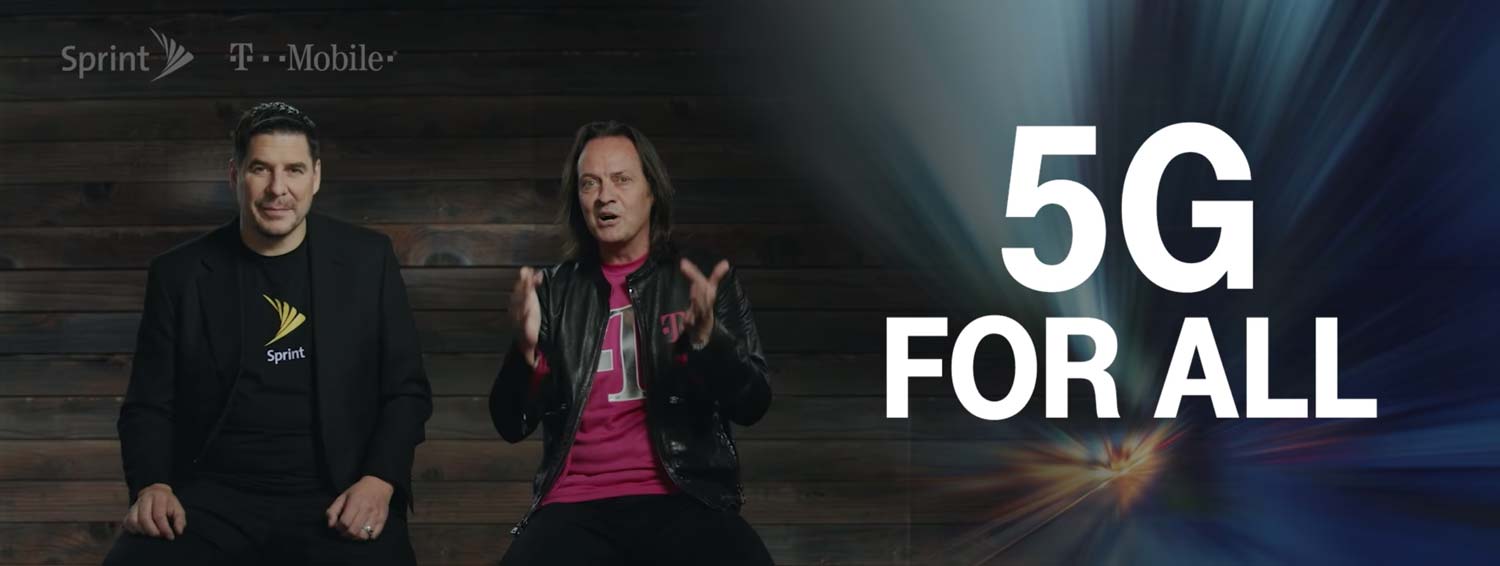T-Mobile-Sprint Merger: All Your Questions Answered
What will a combination of T-Mobile and Sprint mean for wireless phone service? We take a closer look at the $26 billion merger and how it might impact wireless customers.
Editors' Note: Updated at 2:47 p.m. with additional analyst comment.
Wireless phone service could be in for a big shake-up. T-Mobile and Sprint have announced plans to merge, completing a years-long negotiation that will bring the third- and fourth-largest U.S. wireless service providers under one roof. Now the real questions begin.

Regulators still have to sign off on the merger, and both Sprint and T-Mobile still need to provide more details about just what their merger will mean for current and future customers of either carrier. But with the ink still drying on the Sprint-T-Mobile merger agreement, here’s what we know so far about the combined company’s plans and how that could potentially impact your wireless service.
What are the details of the merger?
T-Mobile is using stock to snap up Sprint, with the deal valued at around $26 billion. (For context, the AT&T-Cingular deal in 2004 was valued at around $41 billion.) The combined version of Sprint and T-Mobile will be known as T-Mobile, with John Legere, T-Mobile’s high-profile CEO, running the new company.
The push for rolling out the 5G networking standard in the coming years seems to be a big motivator for Sprint and T-Mobile combining forces. "Only the new T-Mobile will have network spectrum and technology to quickly create a broad and deep 5G network in the first few years of the 5G innovation cycle," Legere said in a video announcing the merger.

Should the merger go through, T-Mobile says it will have the nation’s highest-capacity network, with 30 times the capacity T-Mobile claims today.
What happens next?
The key phrase up above is “should the merger go through.” Both the Federal Communications Commission and the U.S. Department of Justice have to OK any combination of Sprint and T-Mobile. T-Mobile and Sprint executives are hoping to wrap that up by the first half of next year, though the government might have something to say about that time table.
Regulatory concerns have been enough to scuttle similar mergers in the past. A 2011 proposal that would have combined AT&T and T-Mobile and a 2014 deal between Sprint and T-Mobile were both derailed by regulatory concerns.
Jason Leigh, IDC's senior research analyst for mobility, noted that the "current FCC leadership appears to be much more agreeable to a tie up of this nature," though the Trump administration hasn't gone particularly easy on carriers. AT&T's attempt to merge with Time Warner faces Justice Department opposition, and AT&T and Verizon are being investigated about possible collusion over embedded SIM cards. "Recent events make the likelihood of approval less clear cut," Leigh said.
There's also the matter of foreign ownership, Leigh added. T-Mobile is owned by Germany's Deutsche Telekom, while Japan's Softbank owns a majority of Sprint. National security concerns were enough for the Trump administration to block Singapore-based Broacom's proposed takeover of Qualcomm.
Lynette Luna, principal analyst for global telecom consumer services platforms and devices at GlobalData, says that gaining regulatory approval will be a challenge for T-Mobile and Sprint. "It's difficult for either company to demonstrate that their future depends on this merger," she said. "T-Mobile outpaces all other operators when it comes to adding new customers every quarter. Sprint has a shakier balance sheet but also demonstrates it has no problem competing in the market, especially with a parent company like SoftBank."
I’m a T-Mobile customer: how will this affect me?
Some good news, first: you're unlikely to feel any impact while regulatory approval is still pending. "From a regulatory perspective, this deal is far from a sure thing so neither operator can afford to let up competitively," Luna said. The immediate impact may be fewer promotions where the two merging companies look to outdo each other, she added.
And that raises longer-term concerns. Considering how innovative T-Mobile has been over the last few years in pushing customer-friendly initiatives to gain new subscribers, current customers of the Uncarrier may be wondering if that will continue once the addition of Sprint causes the company’s customer base to swell. Just to cite two examples, T-Mobile eliminated mandatory two-year service agreements and pushed unlimited data plans — two initiatives quickly copied by its competitors. With one less carrier to compete with, the concern might be that those kind of changes become fewer and far between.
MORE: The Best and Worst Phone Carriers
There’s also the matter of pricing. Both T-Mobile and Sprint have been especially aggressive with how they price their monthly plans, again with an eye toward winning over customers from AT&T and Verizon (not to mention each other). With Sprint soon to be part of T-Mobile, does the carrier continue to offer an unlimited data plan that undercuts its remaining rivals?
More details about T-Mobile’s future plans are likely to trickle out during the regulatory review process, but a definitive answer about how pricing and plans are impacted probably won’t come until after the merger moves forward.
One thing does seem pretty definite, though, if the merger goes through. "Those innovations will end," Luna said. "With three carriers, price pressure will exist but overall prices will most certainly rise."
Leigh isn't so sure. "Given the Uncarrier philosophy and John Legere’s penchant for disruption, positioning this as a step toward limited choice it is a bit of a reach," he said. "At the very least it is too early to tell. Many other countries successfully operate with a three-provider system."
I’m a Sprint customer: how will this affect me?
One of the biggest challenges in this merger will be to bring Sprint customers over to T-Mobile’s network, as the two carriers currently have incompatible networks. Sprint uses the CDMA network standard, while T-Mobile uses GSM.
Executives from the two companies say it could take up to three years to move Sprint customers over to T-Mobile’s network.
That said, an estimated 20 million Sprint customers already own phones that are compatible with T-Mobile’s network, thanks to phones that support multiple LTE bands.
What about prepaid services?
That figures to be a major point of concern with the T-Mobile-Sprint merger, even if it doesn’t necessarily grab the headlines. T-Mobile-owned MetroPCS and Sprint-owned Boost have been trying to win over prepaid customers with a series of dueling high-data, low-cost plans.
Lately, the rival carriers have offered generous discounts on multiple lines for families that switch their service over from one carrier to the other. That seems unlikely to continue, if Sprint’s prepaid subsidiaries now live under the same umbrella as T-Mobile’s MetroPCS brand. And that could potentially it low-income customers the hardest since they depend on competitive prepaid rates.
"The new T-Mobile has a 40 percent share of the prepaid market served by Boost/MetroPCS and nearly double the prepaid subscribers as No. 2 AT&T," Leigh said. "While prepaid customers should see some benefits in network coverage and reliability, the share position removes some of the competitive incentives to keep prepaid pricing down."
However, Luna said that prepaid services could offer the combined T-Mobile a way to address regulatory concerns, with MetroPCS acting like a distinct subsidiary to fill in any competitive gap.
What's more, both T-Mobile and Sprint make their networks available to mobile virtual network operators (MVNOs), who in turn offer lower rates to customers. That's likely to continue. "In fact, we could see both companies use that as a lever to argue that, indeed, their merger could result in a more vibrant MVNO market," Luna added.
What impact will this have on the transition to 5G?
To hear Sprint and T-Mobile tell it, jump-starting the transition to the 5G networking standard is a primary motivator for this merger.

Later this year, the final 5G standard is going to be approved, but carriers are already working to deploy 5G-capable equipment. T-Mobile plans to bring 5G-capable equipment to 30 U.S. cities this year, with plans to begin offering the higher-speed service in 2019 both a nationwide roll-out in 2020. Likewise, Sprint had been planning to deploy 5G in 2019 as well.
MORE: The Truth About 5G: What's Coming This Year
But rival carriers AT&T and Verizon have 5G rollout plans of their own. AT&T will launch 5G in 12 cities by the end of 2018, while Big Red is bringing fixed 5G broadband to homes in six markets this year.
T-Mobile and Sprint figure that combining forces will help them get the jump on bringing 5G to the masses. But the two companies see their merger as more than a way to gain an edge over other U.S. carriers — it’s also about making sure that the U.S. is among the early 5G adapters as well (though that argument seems like it’s geared toward convincing regulators that they should green-light the merger).
“No one company has the depth and breadth required to do [5G deployment] quickly except the new T-Mobile,” Legere said.
Luna agreed that a combined company would certainly thrive at rolling out 5G. "Sprint has a goldmine of spectrum that will be extremely useful for T-Mobile to roll out a comprehensive 5G experience," she said. "If a merger is consummated, it will take years for the two companies to truly combine, but they can immediately take advantage of each other's networks for better coverage for consumers."
Senior Writer Andrew E. Freedman contributed to this report.
Sign up to get the BEST of Tom's Guide direct to your inbox.
Get instant access to breaking news, the hottest reviews, great deals and helpful tips.
Philip Michaels is a Managing Editor at Tom's Guide. He's been covering personal technology since 1999 and was in the building when Steve Jobs showed off the iPhone for the first time. He's been evaluating smartphones since that first iPhone debuted in 2007, and he's been following phone carriers and smartphone plans since 2015. He has strong opinions about Apple, the Oakland Athletics, old movies and proper butchery techniques. Follow him at @PhilipMichaels.

